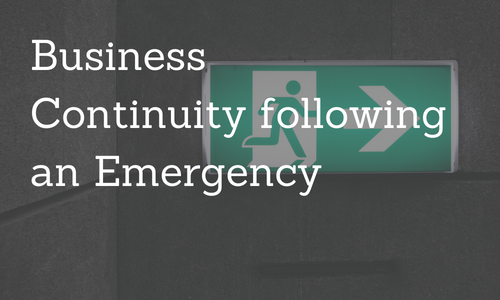Emergencies or disasters can have a devastating effect on businesses. Workplace emergencies could cause a business to shut down temporarily, consider alternative ways to operate, implement contingencies or close permanently. Have you thought about what would happen to your business or your staff if you were impacted by an emergency or disaster? How would your business survive that sort of impact? Do you have a business continuity plan in place to manage this occurrence?
Emergencies and disasters can impact your business in many ways.
- A fire in your building can cause serious damage to the facility and equipment and could also cause injury to staff and other occupants.
- A severe storm cell could cause flooding, inundating your building with water damage and potentially causing the structure to collapse or the building to be isolated.
- An earthquake could cause serious structural damage and local infrastructure damage.
- Pandemics or serious viral issues, such as COVID19, can affect staffing and severely disrupt your business operations.
If you think about all the different types of emergencies and disasters that could happen, then you can identify similar impacts that could affect your business.
Quite often businesses will go about their daily operations and not consider the impact of emergency incidents, thinking what we’ve all thought before; ‘it won’t happen to me’. But what if it does happen to you?
The Emergency Management Framework
All businesses really should have a business continuity plan in place to ensure the business can continue to operate post emergency or disaster.
The emergency management framework considers:
- planning for emergencies,
- preparing for emergencies,
- responding to the emergency, and
- recovering from the emergency.
Business Continuity planning looks at the recovery aspect of emergency management.
There is a definite process that needs to be followed in developing a business continuity plan that best meets the needs of your business.
The process will include such things as:
- Clearly defining how your business operates
- Equipment and resource requirements for your business
- How are stakeholder needs normally met by your business
- Conduct a risk assessment to determine the types of emergencies and disasters that are most likely to impact on your business and what that impact would look like
- What are the contingencies that you would need to have identified in order to move into the recovery process and implement the business continuity plan
- What are the potential costs for implementing the business continuity plan
When should a business continuity plan be developed?
While we’re stating the obvious, it’s important that your business continuity plan needs to be developed well before your business is impacted by the emergency or disaster. It is clearly too late once the impact is felt.
Having a well-developed business continuity plan in place could very well mean the difference between your business surviving and moving forward post emergency or whether it collapses and goes under.
If you haven’t thought about the impact of emergencies on your business and you would like to do something about it, Workplace Emergency Management can help you. Get in touch with us via our contact form or give us a call on 1300 831 694 and let us help you to keep your business afloat.
GET IN TOUCH
Are you ready for peace of mind that your workforce is as safe and prepared as possible?
With a dedicated team of staff ready to help you meet compliance requirements and improve the overall safety of your workplace, all you need to do is get in touch.
Request your free audit today!



